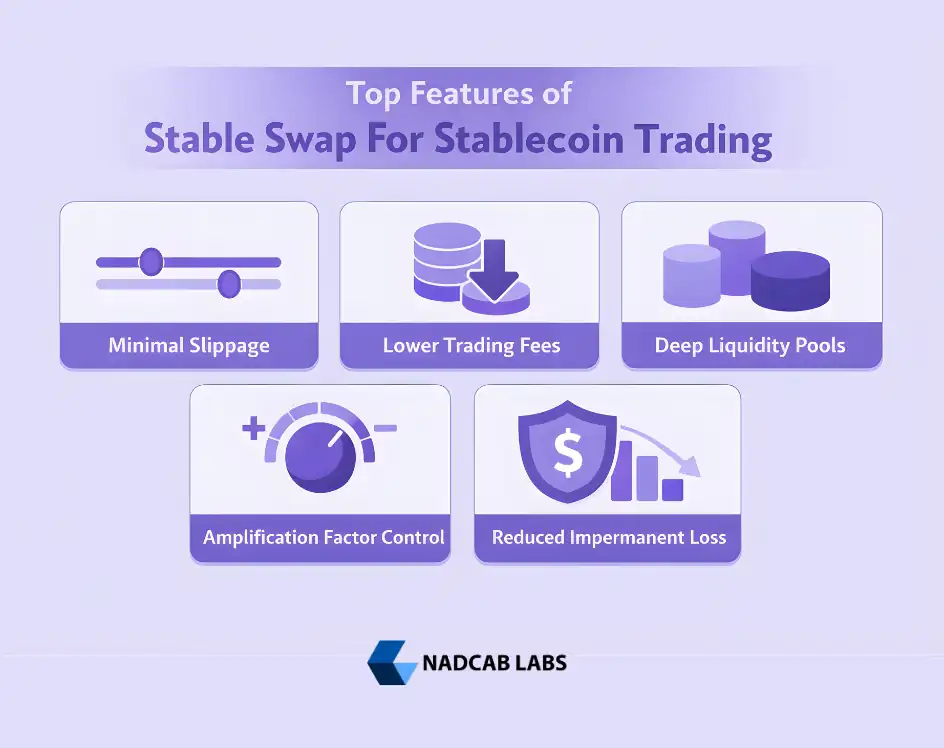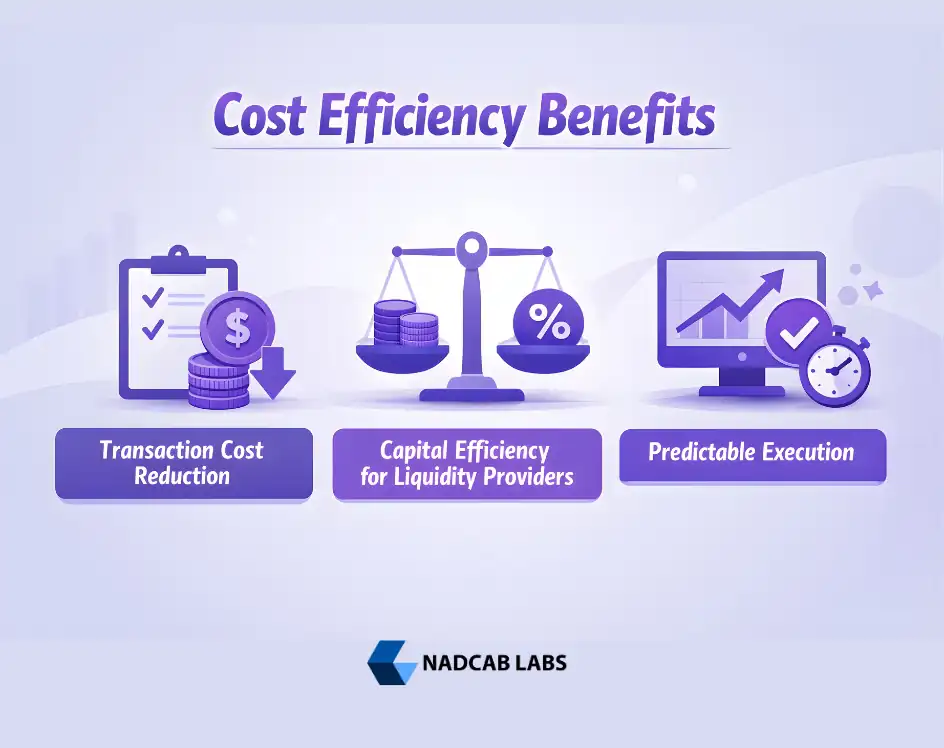Stablecoin trading has become a cornerstone of decentralized finance, with transaction volumes reaching unprecedented levels. As users increasingly rely on stablecoins for trading, payments, and yield generation, the need for efficient exchange mechanisms has driven specialized protocol innovation. Among these innovations, Stable Swap stands out as a purpose-built solution designed specifically for trading assets that maintain similar values. Understanding the top features of Stable Swap for stablecoin trading helps traders and liquidity providers make informed decisions about where to execute their transactions.
Traditional automated market makers work well for volatile asset pairs but create unnecessary friction when trading stablecoins. The token development of Stable Swap algorithms addressed this limitation by concentrating liquidity around the expected price point, enabling trades with minimal slippage and lower fees. This specialized approach has made Stable Swap protocols essential infrastructure for anyone working with stablecoins in the DeFi ecosystem.
Key Takeaways
- Low Slippage: Stable Swap algorithms minimize price impact by concentrating liquidity around the expected peg, enabling large trades without significant value loss.
- Reduced Fees: Specialized stablecoin pools charge fees as low as 0.04%, compared to 0.3% on general-purpose AMMs, significantly reducing trading costs.
- Deep Liquidity: Multi-asset pools like the 3pool (USDT, USDC, DAI) provide some of the deepest stablecoin liquidity in DeFi for institutional-sized trades.
- Amplification Factor: The adjustable A parameter controls how flat the bonding curve remains, optimizing for near-zero slippage when pools are balanced.
- Reduced Impermanent Loss: Since stablecoins trade at similar values, liquidity providers face significantly lower impermanent loss compared to volatile pairs.
- Multi-Token Pools: Stable Swap pools can hold up to eight tokens, enabling efficient swaps between multiple stablecoins in a single transaction.
- Capital Efficiency: Concentrated liquidity around the peg means less capital is needed to provide the same depth compared to constant-product AMMs.
- Price Stability: The hybrid bonding curve maintains stable prices during normal conditions while protecting against complete liquidity drain during extreme imbalances.
What Is Stable Swap?
Stable Swap is a specialized automated market maker (AMM) algorithm designed specifically for exchanging assets that trade at similar values, primarily stablecoins. Unlike general-purpose AMMs that use the constant-product formula (x * y = k), Stable Swap employs a hybrid bonding curve that combines characteristics of both constant-sum and constant-product invariants. This mathematical innovation allows for extremely efficient trades between stablecoins with minimal price impact.
The concept emerged from recognizing that stablecoins represent a unique asset class. When trading USDC for USDT, both tokens should theoretically be worth exactly one dollar. Using a standard AMM for this trade wastes liquidity by distributing it across price ranges that will never be used. Stable Swap concentrates liquidity precisely where it matters, around the one-to-one exchange rate, making trades dramatically more efficient. Understanding web3 tokens and their characteristics helps explain why specialized trading mechanisms are necessary.
The Mathematics Behind Stable Swap
The Stable Swap invariant combines two simpler mathematical models. The constant-sum formula (x + y = k) provides zero slippage but can completely drain one asset from the pool. The constant-product formula (x * y = k) prevents drainage but creates high slippage. Stable Swap blends these approaches using an amplification coefficient that determines how the curve behaves.
When pools are balanced, the curve behaves almost like a straight line, providing near-zero slippage. As pools become imbalanced, the curve gradually shifts toward the constant-product model, increasing slippage to discourage further imbalance and prevent complete drainage. This dynamic adjustment represents years of research into optimal market-making mechanisms for pegged assets.
Top Features of Stable Swap For Stablecoin Trading
The top features of Stable Swap for stablecoin trading address the specific challenges that arise when exchanging similarly-valued assets. Each feature contributes to a more efficient, cost-effective trading experience that has made Stable Swap protocols essential DeFi infrastructure.

Minimal Slippage
Slippage represents the difference between the expected price of a trade and the actual execution price. In traditional AMMs, large trades can cause significant slippage because moving along the constant-product curve creates substantial price impact. Stable Swap dramatically reduces this problem by concentrating liquidity near the expected exchange rate.
Research shows Stable Swap achieves approximately 2.5 basis points of slippage for $1 million swaps compared to over 15 basis points on standard AMMs. This 84% improvement in execution quality makes a meaningful difference for traders, especially those moving substantial volumes. The development of these efficient mechanisms has attracted institutional participants who require predictable execution for large orders.
Lower Trading Fees
Because stablecoins exhibit minimal volatility, Stable Swap pools can charge much lower fees than general-purpose AMMs. While platforms like Uniswap charge 0.3% per trade on standard pools, Stable Swap protocols typically charge only 0.04%. This nearly tenfold reduction in fees significantly impacts profitability for frequent traders and arbitrageurs.
Lower fees become particularly important for algorithmic stablecoin contracts and automated strategies that execute many transactions. The compounding effect of reduced fees over hundreds or thousands of trades can mean the difference between profitable and unprofitable strategies.
Deep Liquidity Pools
Stable Swap enables multi-asset pools that can hold several stablecoins simultaneously. The popular 3pool containing DAI, USDC, and USDT provides some of the deepest stablecoin liquidity available in DeFi. This pooling approach means traders can swap between any of the included stablecoins in a single transaction without routing through intermediate pairs.
Deep liquidity attracts more trading volume, which generates more fees for liquidity providers, which attracts more liquidity. This virtuous cycle has made certain Stable Swap pools the default destination for large stablecoin trades. Building these deep liquidity venues has been crucial for institutional DeFi adoption.
Amplification Factor Control
The amplification factor (A) is a key parameter that controls how flat the Stable Swap bonding curve remains. Higher A values (typically 100-400 for stablecoin pools) keep the curve nearly linear when pools are balanced, providing minimal slippage. As pools become imbalanced, the effective amplification decreases, causing the curve to behave more like a constant-product AMM.
This adjustable parameter allows pool creators to optimize for their specific use case. Pools containing assets with tighter pegs can use higher amplification, while pools with assets that might deviate slightly from their target value might use lower amplification for safety. Working with experienced crypto token solutions providers helps ensure optimal parameter selection.
Reduced Impermanent Loss
Impermanent loss occurs when the relative prices of assets in a liquidity pool change, causing liquidity providers to end up with less value than if they had simply held their assets. Since stablecoins are designed to maintain stable values relative to each other, Stable Swap liquidity providers face dramatically reduced impermanent loss risk compared to volatile asset pairs.
This reduced risk makes providing liquidity more attractive, drawing in capital that might otherwise stay on the sidelines. More capital means deeper pools, which means better execution for traders. The low-risk nature of stablecoin liquidity provision has made it a popular entry point for DeFi newcomers.
How Stable Swap Integrates With DEXs
Stable Swap protocols integrate into decentralized exchange infrastructure as specialized trading venues for stablecoin pairs. Rather than replacing general-purpose AMMs, they complement them by handling a specific category of trades more efficiently. Most major DeFi ecosystems now include some implementation of Stable Swap mechanics.
Smart Contract Architecture
The integration process involves deploying smart contracts that implement the Stable Swap invariant and connect to the broader DEX infrastructure. These contracts manage liquidity pools, calculate swap rates, and execute trades. Building secure, efficient implementations requires careful attention to mathematical precision and gas optimization.
Modern Stable Swap implementations support various token types including rate-oracle tokens, ERC4626 tokens, and rebasing tokens. This flexibility allows the same underlying mechanism to serve diverse use cases beyond simple stablecoin swaps, including liquid staking tokens and other pegged assets. Choosing the right blockchain for token creation affects how these integrations function.
Router and Aggregator Support
DEX aggregators automatically route trades through Stable Swap pools when they offer better rates than alternatives. This seamless integration means users benefit from Stable Swap efficiency without needing to interact with these protocols directly. Smart routing algorithms compare quotes across multiple venues and split large orders to minimize overall slippage.
Cost Efficiency Benefits
The cost advantages of Stable Swap extend beyond simple fee comparisons. Multiple factors combine to create meaningful savings for both traders and liquidity providers.

Transaction Cost Reduction
By combining lower fees with reduced slippage, Stable Swap dramatically lowers the total cost of trading stablecoins. A trader swapping $100,000 in USDC for USDT might save several hundred dollars compared to using a standard AMM. These savings compound over time for active traders and automated strategies.
Capital Efficiency for Liquidity Providers
Stable Swap’s concentrated liquidity means providers can achieve meaningful fee income with less capital at risk. The development of capital-efficient mechanisms has democratized liquidity provision, allowing smaller participants to earn competitive returns without committing massive sums.
Predictable Execution
The stable pricing characteristics of these pools provide predictable execution for traders planning large transactions. Unlike volatile pairs where market conditions can change rapidly, stablecoin pools offer consistent quotes that traders can rely on when timing their transactions.
High Volume Trading Capabilities
Stable Swap protocols are engineered to handle significant trading volumes efficiently. The combination of deep liquidity, low slippage, and optimized smart contracts enables smooth operation even during periods of high market activity.
Institutional-Grade Infrastructure
The ability to execute large trades without significant price impact has attracted institutional participants to DeFi. Stablecoin trading volumes reached $33.4 trillion in a recent year, representing a 29% increase over the previous period. Much of this volume flows through Stable Swap pools designed to handle exactly these large transactions.
Pools maintaining billions in total value locked provide the depth necessary for institutional-sized trades. The development of this infrastructure has been essential for bridging traditional finance and DeFi, as institutional participants require execution quality comparable to centralized venues.
Dynamic Adjustment Mechanisms
During periods of extreme market stress, Stable Swap pools automatically adjust their behavior. If one stablecoin begins losing its peg, the bonding curve shifts to prevent liquidity providers from absorbing all the losses. This self-protective mechanism has proven crucial during various stablecoin stress events.
Impact on DeFi Ecosystem
The introduction and widespread adoption of Stable Swap has fundamentally changed how stablecoin liquidity functions in DeFi. These protocols now serve as critical infrastructure that other applications build upon.
Composability Benefits
Lending platforms, yield aggregators, and other DeFi protocols integrate with Stable Swap pools to enhance their stablecoin liquidity. When a lending protocol needs to liquidate collateral and convert it to stablecoins, routing through Stable Swap pools ensures efficient execution. This composability means improvements to Stable Swap benefit the entire DeFi ecosystem.[4]
Stablecoin Issuance Support
New stablecoin issuers rely on Stable Swap pools to establish liquidity for their tokens. Efficient trading venues are essential for bootstrapping new stablecoins, as users need confidence they can enter and exit positions efficiently. This infrastructure has enabled the growth of diverse stablecoin options beyond the original market leaders.
Cross-Chain Expansion
Stable Swap implementations now exist across multiple blockchain networks including Ethereum, Polygon, Arbitrum, Avalanche, and others. This multi-chain presence ensures traders can access efficient stablecoin swaps regardless of which network they use. As bridges and cross-chain protocols mature, Stable Swap pools on different chains increasingly work together to provide seamless multi-chain stablecoin liquidity.
Build Efficient DeFi Infrastructure
Understanding Stable Swap mechanics is essential for building effective stablecoin trading solutions. Expert guidance helps navigate the technical complexities of AMM development.
Security Considerations
While Stable Swap protocols offer significant advantages, users should understand the associated risks. Smart contract vulnerabilities, oracle dependencies, and economic attacks all represent potential threats that protocol designers must address.
Smart Contract Auditing
Reputable Stable Swap implementations undergo extensive security audits before deployment. The mathematical complexity of the bonding curve calculations requires careful implementation to avoid precision errors that could be exploited. Users should verify that pools they interact with have been properly audited.
Depeg Risk Management
If a stablecoin in a pool loses its peg significantly, liquidity providers can face losses as arbitrageurs drain the more valuable token from the pool. The development of oracle integrations and automatic protective mechanisms helps mitigate this risk, but it cannot be eliminated entirely. Diversifying across multiple pools and stablecoins provides additional protection.
Conclusion
The top features of Stable Swap for stablecoin trading represent a significant advancement in DeFi infrastructure. By concentrating liquidity where it matters most and optimizing specifically for pegged assets, these protocols deliver dramatically better execution than general-purpose AMMs. Lower slippage, reduced fees, deep liquidity, and capital efficiency combine to create trading venues that serve everyone from retail users to institutional participants.
As stablecoin adoption continues growing and new use cases emerge, Stable Swap protocols will remain essential infrastructure for the DeFi ecosystem. The development of these specialized mechanisms demonstrates how targeted innovation can solve specific problems more effectively than one-size-fits-all approaches. For anyone trading stablecoins regularly, understanding how Stable Swap works and leveraging its advantages can meaningfully improve trading outcomes and liquidity provision returns.
Frequently Asked Questions
Stable Swap uses a hybrid bonding curve that concentrates liquidity around expected price points, while standard AMMs distribute liquidity evenly across all price ranges. This specialization enables lower slippage and fees for stablecoin trades.
Higher amplification values keep the bonding curve flatter, providing lower slippage when pools are balanced. Lower values make the curve behave more like constant-product AMMs, increasing slippage protection during pool imbalances.
Stablecoins exhibit minimal price volatility, so liquidity providers face less risk. This reduced risk allows pools to charge fees as low as 0.04% while still attracting sufficient liquidity to maintain deep trading venues.
Yes, Stable Swap pools are specifically designed for large trades. Deep liquidity pools combined with concentrated liquidity around the peg enable institutional-sized transactions with minimal price impact and predictable execution.
Impermanent loss occurs when asset prices in a pool change relative to each other. Since stablecoins maintain similar values, Stable Swap liquidity providers face dramatically lower impermanent loss compared to volatile asset pairs.
Stable Swap pools can hold up to eight different tokens, allowing direct swaps between any pair without routing through intermediate assets. This reduces transaction costs and simplifies trading between multiple stablecoins.
Primary risks include smart contract vulnerabilities, stablecoin depeg events, and economic attacks. Users should verify pool audits, diversify across multiple stablecoins, and understand the protective mechanisms each pool implements.
Reviewed & Edited By

Aman Vaths
Founder of Nadcab Labs
Aman Vaths is the Founder & CTO of Nadcab Labs, a global digital engineering company delivering enterprise-grade solutions across AI, Web3, Blockchain, Big Data, Cloud, Cybersecurity, and Modern Application Development. With deep technical leadership and product innovation experience, Aman has positioned Nadcab Labs as one of the most advanced engineering companies driving the next era of intelligent, secure, and scalable software systems. Under his leadership, Nadcab Labs has built 2,000+ global projects across sectors including fintech, banking, healthcare, real estate, logistics, gaming, manufacturing, and next-generation DePIN networks. Aman’s strength lies in architecting high-performance systems, end-to-end platform engineering, and designing enterprise solutions that operate at global scale.







